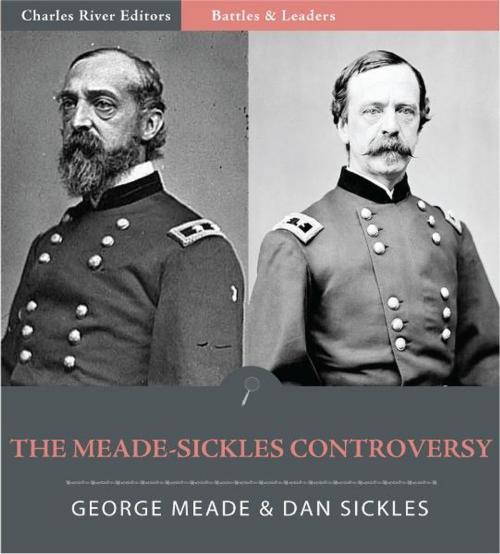Battles & Leaders of the Civil War: The Meade - Sickles Controversy (Illustrated Edition)
Nonfiction, History, Americas, United States, Civil War Period (1850-1877), 19th Century, Military| Author: | George Meade & Dan Sickles | ISBN: | 9781619829770 |
| Publisher: | Charles River Editors | Publication: | February 20, 2012 |
| Imprint: | Language: | English |
| Author: | George Meade & Dan Sickles |
| ISBN: | 9781619829770 |
| Publisher: | Charles River Editors |
| Publication: | February 20, 2012 |
| Imprint: | |
| Language: | English |
George Gordon Meade (December 31, 1815 November 6, 1872) was a career United States Army officer and civil engineer. During the Civil War he served as a Union general, rising from command of a brigade to command of the Army of the Potomac just days before the Battle of Gettysburg. Naturally, he is best known for defeating Lees Army of Northern Virginia at Gettysburg in July 1863. Daniel Edgar Sickles (October 20, 1819 May 3, 1914) was one of the most well known generals in the North during the Civil War, for all the wrong reasons. As an antebellum New York politician, Sickles was involved in a number of public scandals, most notably the killing of his wife's lover, Philip Barton Key II, son of Francis Scott Key. He was acquitted with the first use of temporary insanity as a legal defense in U.S. history. From there, he became one of the most prominent political generals of the Civil War. At the Battle of Gettysburg, he insubordinately moved his III Corps to a position on Day 2 that created a salient in the Union line. Although he would constantly defend his maneuver, the move destroyed his corps and nearly ruined the Army of the Potomacs left flank. Sickles move continues to generate controversy and debate among historians today. Moreover, his combat career ended at Gettysburg when his leg was struck by cannon fire. Sickles and Meade would feud over the actions on Day 2 in the years after the war, with Meade explaining his actions, and Sickles taking credit for the victory by disrupting Lees attack plans on Day 2. Historians have sided with Meade, but the two duked it out in paper via letters that were eventually published in the well known Battles & Leaders series. This edition of Battles & Leaders of the Civil War: The Meade-Sickles Controversy includes both generals letters in response to each other. It is also specially formatted with pictures of Gettysburgs important commanders.
George Gordon Meade (December 31, 1815 November 6, 1872) was a career United States Army officer and civil engineer. During the Civil War he served as a Union general, rising from command of a brigade to command of the Army of the Potomac just days before the Battle of Gettysburg. Naturally, he is best known for defeating Lees Army of Northern Virginia at Gettysburg in July 1863. Daniel Edgar Sickles (October 20, 1819 May 3, 1914) was one of the most well known generals in the North during the Civil War, for all the wrong reasons. As an antebellum New York politician, Sickles was involved in a number of public scandals, most notably the killing of his wife's lover, Philip Barton Key II, son of Francis Scott Key. He was acquitted with the first use of temporary insanity as a legal defense in U.S. history. From there, he became one of the most prominent political generals of the Civil War. At the Battle of Gettysburg, he insubordinately moved his III Corps to a position on Day 2 that created a salient in the Union line. Although he would constantly defend his maneuver, the move destroyed his corps and nearly ruined the Army of the Potomacs left flank. Sickles move continues to generate controversy and debate among historians today. Moreover, his combat career ended at Gettysburg when his leg was struck by cannon fire. Sickles and Meade would feud over the actions on Day 2 in the years after the war, with Meade explaining his actions, and Sickles taking credit for the victory by disrupting Lees attack plans on Day 2. Historians have sided with Meade, but the two duked it out in paper via letters that were eventually published in the well known Battles & Leaders series. This edition of Battles & Leaders of the Civil War: The Meade-Sickles Controversy includes both generals letters in response to each other. It is also specially formatted with pictures of Gettysburgs important commanders.















